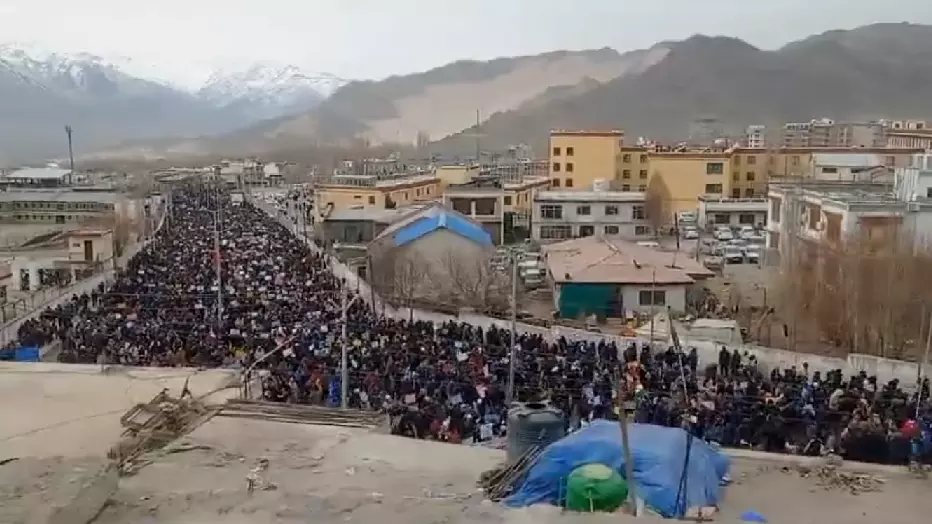
Why are Ladakhis protesting in the freezing cold?
Ladakh residents have been protesting for the past three years, demanding statehood for the UT and its inclusion in the Sixth Schedule of Constitution

The protest by Ladakhis, demanding statehood status for the Union territory and its inclusion in the Sixth Schedule of the Constitution, has gathered substantial pace over the past few days.
February 3 saw thousands of Ladakh residents braving the biting cold and marching onto the streets of Leh and Kargil in support of the protest call given by the Kargil Democratic Alliance (KDA) and the Leh Apex Body (LAB), two organisations fighting for the rights of locals for the past three years.
Even though the central government has agreed to hold a fresh round of talks with the protesters on February 19, Ramon Magsaysay award winner Sonam Wangchuk, who is also helming the protests, is said to have proposed a fast unto death in support of the demands.
What is the protest all about? Here are the details:
What are the demands?
Ever since the central government in 2019 abrogated Article 370, stripping Jammu and Kashmir of its special status and splitting it into two Union territories, Ladakh – one of the UTs – has witnessed a slew of protests.
Protesters under the aegis of KDA and LAB have put before the Centre two major demands – granting separate statehood status to Ladakh and including it under the Sixth Schedule of the Constitution to safeguard the region’s language, culture, environment and land.
The Leh Council demands constitutional safeguards for the protection of land, employment guarantee, protection of culture, trade and environment and extension of provision of the Constitution to the hill councils.
The Kargil resolution has four demands – statehood for Ladakh, Sixth Schedule status for Ladakh, two parliamentary seats in Ladakh instead of one and job security and early job recruitment.
Has abrogation of Article 370 affected Ladakh?
When the erstwhile state of Jammu and Kashmir was split into two UTs of Jammu and Kashmir and Ladakh, the latter, which was one of the three divisions of the state earlier, also lost its special privileges and powers that came under statehood status.
Unlike the UT of Jammu and Kashmir, Ladakh was established without an elected legislature. Instead, the Ladakh Autonomous Hill Development Councils of Leh and Kargil were set up to administer the region – these again have limited powers.
Before the abrogation, Ladakh sent four representatives to the Jammu and Kashmir assembly and two to the Legislative Council.
While Ladakhis initially hoped that the reorganisation would do justice to religious minorities who faced alleged discrimination by Kashmir-based parties, it soon fizzled out. Ladakhis now fear that opening the area to industrialists and non-locals will alter the region’s demography.
This is why LAB and KDA have been demanding the government to grant the region special status just like the northeastern states. The status would ensure protection to the tribal communities and provide them autonomy through autonomous development councils.
The realisation also dawned upon residents that the central government had little knowledge about the region’s needs and the lack of a political representative had virtually left them orphaned.
“We have no representation in the Assembly. Ladakh is strategically a very important place. This has always been our demand that the people of Ladakh should have representation and that we should get statehood,” The Hindu quoted Haji Ghulam Mustafa, a legal adviser of the protesters as saying.
An emerging job crisis in the region – 26.5 per cent of graduates in Ladakh are unemployed, a government survey said last year – goaded residents to take to the streets.
When did the protests take off?
Kargil, which has a Muslim majority population mostly saw a slew of protests with residents demanding to remain part of Jammu and Kashmir instead of being clubbed with Buddhist-majority Leh.
Residents in Leh also said that the reorganisation has taken away protection granted under Article 35A. Wangchuk, who in June last year staged a ‘climatic fast’ to protect Ladakh’s fragile ecology, staged a five-day hunger strike in January this year.
Since August 2021, LAB ad KDA have been leading the protests in the region.
During the February 3 protest in Leh, Wangchuk alleged that while the BJP in its election manifesto for the 2019 Lok Sabha polls and the 2020 Leh Hill Council polls had promised to include Ladakh in the Sixth Schedule, but now the Centre has maintained a “deafening silence” on the same.
A similar agitation was organized by LAB and KDA in Kargil too.
Earlier in January, both LAB and KDA had organised a demonstration outside the Press Club in Jammu where they announced a protest calendar including a rally in Delhi in the third week of February.
While the central government is trying to iron out issues with the protesters through dialogue, the latter say they will not budge until the government meets their four major demands including creation of two separate parliamentary constituencies for Leh and Kargil districts, recruitment and job reservation for the youth of Ladakh and creation of a public service commission.
“We will move to Jantar Mantar, Delhi in the third week of February and will follow it up by village, block and district-level protests across the UT of Ladakh. We will go for strikes if our demands are not met,” KDA chairperson Asgar Ali Karbalai was quoted as saying.
What has the Centre done so far?
In the wake of the protests, the Union Home Ministry in January last year established a 17-member high-powered committee, headed by Minister of State Nityanand Rai, to ensure the “protection of land and employment” for the people of Ladakh.
In a meeting on December 4, KDA and LAB held talks with central representatives, demanding a parliamentary seat each in Leh and Kargil and job reservation for locals.
The next meeting is scheduled for February 19 in New Delhi.

